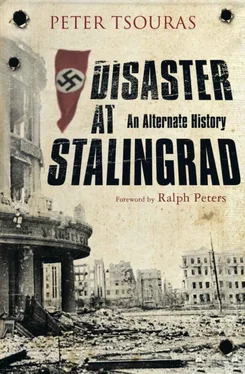Peter Tsouras
DISASTER AT STALINGRAD
An Alternate History
For my friend Thomas Bilbao, without whose enthusiasm, good will, and original thinking this book could never have been written, and to whose incisive insights on the Second World War I am deeply indebted.
FOREWORD
A Matter of Mastery

Ihave all but given up reading alternative history. Too many works in the genre are implausible, historically superficial, emotionally naive, uninformed as to technical expertise and, not least, written in so slovenly a manner that any remaining faith one has in our education systems, whether in the United States or the United Kingdom, collapses like a pup tent in a hurricane. The waste of paper (or electrons, for that matter) in the production of plainly bad books is sufficiently dismaying to turn an oil-company executive into a tree-hugging environmentalist.
But there is one brilliant exception to the sorry state of alternative history: the works of Peter G. Tsouras. His re-imaginings of history always delight, consistently inform, boldly challenge and wonderfully reward discriminating readers (a dying breed, alas…). Why are this old soldier’s narratives so much richer — and so much more fun to read — than the efforts of his would-be peers? To formulate a useful answer, turn to the ‘Five Pillars of Alternative History’, the fundamental requirements for such a book to be worth the cost in money, time and intellectual engagement.
Let’s take these one by one:
A compelling, convincing vision. If an alternative-history narrative does not grip us with logic — the recognition that this could have happened — the entire structure falls flat. It’s not enough to tell a story the author thinks is ‘really cool’, while ignoring or remaining ignorant of the complex web of facts that render his or her version impossible. (I have never had any patience with what I call the ‘spaceships-at-Pearl-Harbor’ school of alternative history.) We have to be captured by the recognition that, yes, but for a few matters of happenstance, the author’s vision might have come to pass, changing history.
This is one regard in which Peter G. Tsouras excels. Whether writing about the American Civil War or the Second World War, his plots are built on taut logic and a vision so convincingly grounded that the reader’s response is, ‘Yes, yes! Absolutely!’
The point of quality alternative history isn’t to push the envelope into the realm of the absurd, but to delve into the precision machinery of history and make small adjustments to the gears that produce major, inevitably different outputs. Indeed, the worst judgement a reader can pass on a work of alternative history is to reach a point in the book at which he or she slams it shut and declares, ‘Naw, that never could have happened.’
So… a crucial quality in this author’s works (and I have read every one of them, avidly) is baseline believability. The logic of the plots is always finely tooled; nor does Tsouras leave loose ends. His vision is always as comprehensive as it is precise in detail. The book you are about to read is a perfect example of the richness of this accomplished author’s grounded-in-fact imagination. Taking his alternative road to Stalingrad, I was, as an old Russia hand, utterly convinced.
Historical and technical knowledge. Two aspects of this author’s background give him an enormous advantage over other practitioners in the genre. He is a sophisticated historian with a wide range of period interests (I can’t help but hope that this proud Greek-American will, one day, write an alternative version of the Trojan War and its after-effects); and he has had a long, successful career as a US Army officer, as well as concurrent responsibilities from the tactical to the strategic level of our intelligence system. He knows what happened, down to the ‘sub-atomic’ details, but his insider experience also lets him grasp why things happened and how slight alterations in events or personal relations might have led to very different outcomes. He knows what soldiers can do and won’t do; and he knows not only what political leaders are supposed to do, but what they actually end up doing. He’s the kind of in-depth historian and experienced soldier who fully understands that, after all of the order-of-battle tables are tallied, the weather and terrain have been analyzed, and the various options studied, a decisive battle may be lost because a key commander had indigestion.
This particular book could not have been written by someone who did not understand historical realities as diverse as the Allied supply route through Iran; ship tonnages on the Murmansk run; Wehrmacht equipment refurbishment policies; the personalities of Soviet and German generals; or opposing sniper techniques. One pleasant surprise for me, by the way, was how thoroughly this soldier understands the environment of mid-twentieth-century naval warfare — his depictions of fleet actions are simply terrific.
Grasp of character. The film may have been fun, but, no, Abraham Lincoln didn’t have the temperament or martial-arts skills to be a Hollywood vampire hunter. Alternative history doesn’t work if the author doesn’t understand the actual personalities of the figures he enlivens on the page — or human complexity in general. One routine problem with alternative-history novels is that they are populated by stick figures, not flesh-and-blood men and women with credible desires, fears, faults and idiosyncrasies. Hitler and Stalin are classic examples. These two men, grotesque and cruel as they may have been, were also human beings with biological imperatives and emotional needs (however twisted). In too many novels or films, Hitler simply rants and Stalin icily orders executions, popping up in plots as cartoons of themselves. In contrast, Tsouras understands that the decisions such men make and the actions they take must be grounded in their actual psychology and mundane circumstances. Of course, the same law applies to less exalted characters, as well.
In developing an alternative-history scenario, an author is free to imagine the behaviour and inner life of a character, as long as his or her projections are based upon the known facts about that individual (this applies to ‘straight’ historical fiction, as well). When Tsouras re-imagines history, the great names come to life — and make credible decisions based on the different developments confronting them. In his plots there are not only no factual loose ends, but no emotional ones, either. That reflects a detailed study of the historical figures, but also a life of careful observation of his fellow human beings.
Writing ability. Different forms of writing demand different prose techniques. In alternative histories, the focus should be on events and characters presented in transparent prose that never calls attention to itself. The writing should be so clean and clear that it disappears, leaving only the author’s vision. But clean, clear writing is very hard. There is always the temptation to turn a clever phrase, or to add another adjective or adverb, or (a common sin) to laundry-list facts that, while showing off the author’s research, bore the reader to blood-tears and push him or her out of the plot. Tsouras has been writing professionally for decades, and the practice shows. Even when he addresses infernally complex situations or arcane technical details, the writing is a spotless window that lures the reader to look deeper inside. Tsouras’s prose isn’t glamorous or extravagant or, for that matter, snappy. It’s disciplined and appropriate.
Читать дальше













